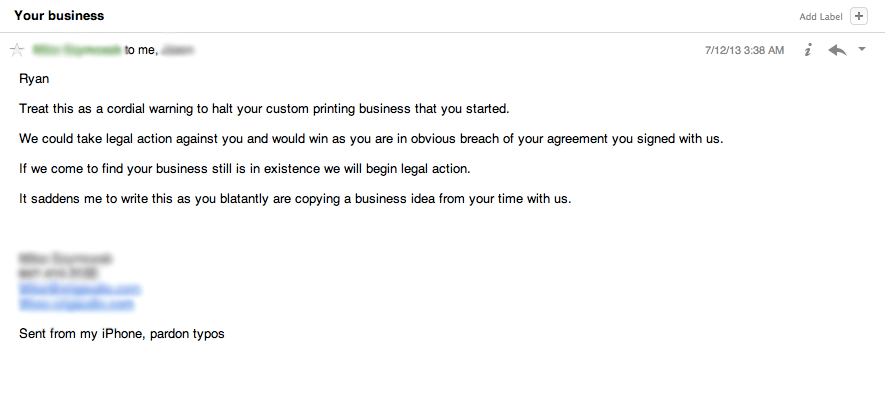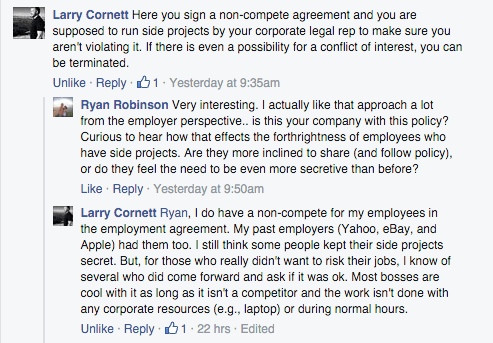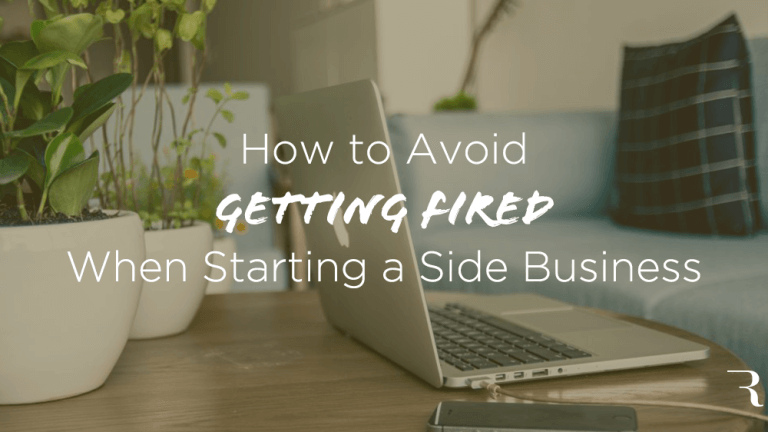A few years ago, during my second job out of college at a clothing startup in Orange County, I was given the ultimatum of letting my side business go, if I wanted to keep my job (and sole source of reliable income).
I vividly remember the conversation I had with my boss, as if it were yesterday.
I was terrified.
Prior to setting a meeting with him to chat about how my first six months on the job had been, he had no idea that I was running a side business in my free time (much more on whether you should tell your boss about your side business or not, below). If you’re still looking for the right business idea to get started on, check out my break down of the 101 Best Side Business Ideas.
I needed to ask for some more flexibility with my schedule for the next month, since I had the opportunity to participate in the LA County Fair, which was a great way to launch my business and gather a ton of objective feedback in a concentrated period of 4 weeks. There was just one problem, the fair was every Wednesday-Sunday for a full month. Not exactly ideal when you have a day job.
So, once we sat down to chat in his office, we started by going over my performance for the past six months, covered my biggest wins, talked strategy for the next quarter, and then it felt like the meeting was just about finished.
It was time to bring up the big question: could I get some schedule flexibility to focus more on my side business for the next month?
The conversation went better than I could’ve imagined.
We talked about what my plans were for my side business, how I saw myself balancing my commitments between the two, and he was even receptive to letting me work staggered, odd hours for the next month, in order to do the fair and keep my day job (because I was over-performing on my targets at work).
I reassured him that I could continue delivering at the same high level of performance, despite working less hours each week and doing some of that work remotely.
He was in. I felt like a champion.

It was a Friday afternoon, and he wanted to confer with his business partner the following week once he was back from a trade show, to make sure they were both on the same page before officially granting me the flexibility. So, I left for the weekend feeling like I had the best of both worlds.
And that next week was when things took a turn for the worse.
My other boss could not have felt more differently about an employee of his running a side business.
Are you committed to this job?
Have you been working on your side business during company time, all along?
Are you just going to quit in another month, anyway?
I fielded a lot of tough questions that I really wasn’t prepared to answer. I thought I had already won this battle. So naturally, my on-the-spot answers weren’t as reassuring as my previous conversation had been.
That talk ended with the ultimatum I had been fearing.
“You’re welcome to stay here and keep doing a great job, but not if you’re running a business on the side.”
My head was spinning for the rest of the afternoon, as I weighed my options. I told them I needed the night to think about it.
Do I keep this job (which I really did like) and effectively place my dreams of being self-employed on hold?
Is my business bringing in enough cash flow to at least give me the bare essentials and cover rent for the foreseeable future?
Do I have enough in savings to justify taking this risk, in the event I’m not able to pay myself a dime for the next few months?
Even though the answers to each of these questions were less than ideal (pretty much a resounding no across the board), I knew in my head what I was already going to do.
The next morning, I turned in my computer, cleared my desk, and quit my day job. I launched into self-employment with a business that wasn’t quite ready to sustain livable salaries for my business partner and I, but I was excited and ready for the challenge.
In hindsight, there are a lot of things I would’ve done differently that could’ve helped me avoid feeling forced to leave my day job too early, and as a consequence placing too much of a burden on my business, that hadn’t yet developed enough cash flow to sustain two full-time incomes. In fact, I wish I would’ve read this post featuring advice from the world’s top entrepreneurs before I started my first business.
We went on to have a very profitable month with Case Escape at the LA County Fair, picked up a lot of momentum, validated the business idea and concept of our B2B Startup Kits, sold the first set for nearly $5,000, and got networked into a group of people that recommended several more good trade shows for us to exhibit at.
However, the business still wasn’t generating enough cash flow to justify paying ourselves a livable wage AND continue re-investing in the growth of the company. So, my business partner and I ended up moving back to our hometowns on different sides of the country for the next 6 months while we cut costs and built our monthly revenue runway.
In many ways, I was actually pretty lucky with the way things shook down.
Even though the decision to prematurely quit my day job launched me into one of the most stressful times of my life, I wouldn’t have done it any other way. The lessons I’d learn over the coming year would go on to define me. And, it forced me to go back to the drawing board and discover my strengths as an entrepreneur.
Plus, there were a lot of things I could’ve done much worse.
My side business wasn’t a conflict of interest (or competitor) to the company I was working at, I hadn’t officially broken any contractual agreements with my employer, and I never worked on my side business during company time.
Whether you’re thinking of starting a side business or you’re already working on one, here are all of my best practices on how to avoid creating a situation that jeopardizes your day job (and reliable source of income). Be careful in navigating these murky waters when you do things like start a blog or launch your own side business.
Here are my 10 Steps to Avoid Getting Fired When Starting a Side Business
Here we go…
1. Know Your Company Policy on Side Businesses.
Many companies actually have formal policies about employees operating a side business. If you didn’t ask, or weren’t briefed on this during your interview and onboarding process, then it’s worth giving all of your employment contracts a thorough read.
If you’re still unsure, or there’s no clear mention on the subject, it is absolutely worth asking someone who’d definitively know the answer to this within your company.
There’s no harm in asking.

Some companies ban or severely limit employees from starting a side business, yet others like Microsoft’s Garage program actually lets employees build their own projects using Microsoft resources, because they believe in the immense value of empowering their employees to start their own businesses. Some companies even change their mind on this policy from time-to-time, just ask Ramon Roy over on the WeWork blog.
When you started your current job, you (hopefully) signed an employment contract and probably some other legal documents. Take a close look at them. One thing you need to look for specifically, is if your employer places limits on whether you can have other employment. Beware of exclusivity clauses, as they are often tied to a non-compete agreement your employer may want you to sign.
Sounds kind of crazy right? While exclusivity clauses are somewhat commonly found in employment contracts, they’re just as negotiable as compensation, start date, and anything else before you actually sign the contract.
I’ve personally had an exclusivity clause taken out of an employment contract before agreeing to sign, simply by asking and telling them that I often do freelance work from home jobs on the side.
If that had been a deal-breaker, then I wouldn’t have been happy working there anyway. It turned out that it wasn’t a big deal to them at all, and was just in their standard employee contract template.
The relatively common exclusivity clause has been one of large political debate recently in a growing number of countries, specifically the United Kingdom and New Zealand, which allow Zero Hour Contracts. With Zero Hour Contracts, you are legally employed for a company, and they can require you to work any set number of hours they need you for, during a given week.
However, the employer is not, in turn, required to give you any guaranteed minimum number of hours, which makes your work (and income) much less predictable by nature.
The Guardian recently reported that, “some companies have even been using exclusivity clauses, meaning their workers are guaranteed no hours, but are prohibited from finding work with anyone else.” The argument being, they need to rely on their employees’ availability.
In general, most companies do not explicitly ban employees from working for anybody else, or having their own side business. However, in exchange for paying you for your time, they will expect to be your first priority if there’s any clash of needs.
As long as your side business doesn’t distract you from the work you’re being paid to do, most employers are going to be supportive, as long as you’re not competing with their business.
2. Read and Understand the Agreements You’ve Signed.
When you started your job, you likely signed one, or all of the following agreements:
- Employment Contract
- Non-Disclosure Agreement
- Non-Compete Clause (often within the Non-Disclosure Agreement)
Examine each of them very carefully, and if there’s anything you’re unsure about, it’s worth the small investment of having an attorney go over them with you for 15-30 minutes. The future success of your side business could depend upon navigating these agreements correctly.
Many companies will insist that employees sign some form of non-compete clause. The most common application of a non-compete clause is designed to ensure that you won’t start a competing business while you’re employed with the company, or within a predetermined amount of time after your employment ends (often 2 years).
However, in the US, many states have complicated restrictions on the enforceability of non-compete clauses, and in California and Hawaii, they are deemed completely unenforceable.
I’ve learned this lesson the hard way myself, after receiving a threat of legal action from a former employer.
Several months after leaving my job at a portable speaker startup (in southern California), and just before I left my next job to go full-time with Case Escape, I was contacted by one of the owners of the speaker company.
They discovered the website for my side business, and felt that it was a breach of my previous employment agreement with them.
Specifically, they felt that I had violated my non-compete agreement, which applied to 2 full years following the end of my employment, and that the business I had started was directly competing with theirs.
Here’s the exact email I got from one of the owners.

Did I freak out? Hell yes.
Did I think I was screwed? Definitely.
Did I actually do anything wrong? Nope.
After (very quickly) finding and consulting with an attorney, we were able to review my employment agreements, verify that the non-compete clause I had signed would not be enforceable (luckily for me, I live in California where these agreements are null and void), and that my side business indeed was not competing with that of my former employer’s.
WHEW.
After a few weeks of not responding to him, knowing that I was legally in the clear, he followed up with me again to check in on if I was still operating my business.
Here’s what I emailed back to him.

To this day, I still haven’t heard back from those former bosses of mine, which is a bummer.
I don’t have any hard feelings against them, as I know they must’ve been acting from a place of feeling betrayed, or that I had used them to get some industry experience in order to launch a competing business.
Had they provided a less hostile environment to talk this situation through, rather than over-reacting, it would’ve avoided a lot of angst on both sides. But hey, it sure sparked a lot of great blog post ideas for me 😉
The point of all this… you need to have an in-depth understanding of the agreements you’ve signed with your employer. Even still, it’s worth having an attorney double-check with you.
Had I not happened to live in the state of California where non-compete’s are void, I may have been forced to go further into the legal process (spending money I didn’t really have), in order to prove that I had not breached any of my signed agreements.
3. Don’t Disclose or Use Proprietary Information from Your Employer.
Without exception, one thing you absolutely cannot do when starting a side business, is steal, use, or share any of your employer’s proprietary intellectual property—any good online business course will teach you this too.

There have been numerous court cases over the years, involving former employers seeking substantial damages (and more commonly cease and desist orders) where there has been evidence of intellectual property theft.
Take this $100M lawsuit for example, between Carter Bryant, the creator of the Bratz line of dolls and his former employer, Mattel. Mattel had alleged that Bryant was in breach of his employment contract because he had done initial sketches and created the first test doll during his time at Mattel while working on the Barbie line.
The court initially ruled that Bryant was liable for $100M in damages. After 7 years of appeals and litigation, a jury eventually overturned the ruling and awarded Bryant’s company $88.5M in damages from Mattel.
To avoid this type of mayhem when starting a side business of your own, you need to very carefully ensure that you’re not accidentally using any of your employer’s proprietary resources and information.
This includes avoiding any patented processes, utilizing trade secrets, and making sure that your ideas are very well-documented and transparent.
4. Don’t Poach Former Co-Workers for Your Side Business.
This one is particularly tempting. You spend so many hours with your co-workers, and built such strong relationships with former colleagues, that it can seem like a natural fit to start working together on a side business.
While my official answer to whether or not you should start a business with your friends or co-workers is, it depends, you must avoid poaching (or inviting) employees from a previous employer, in order to bring them over to your company.
There have been many costly legal battles because entrepreneurs have encouraged fellow (and former) co-workers to jump ship, in order to work for their businesses. This is more common in the startup world, where huge venture funding rounds can catapult what started as a side business, into a rapidly growing enterprise.
While it’s natural that some may choose to join your business down the line, it’s important that you do nothing to encourage them to actively leave the company you previously worked for, or you’ll be at risk of an anti-poaching lawsuit.
5. Don’t Spend Company Time on Your Side Business.
While this one seems like a no-brainer, it’s without a doubt one of the most commonly violated principles of launching a side business.
It often arises out of not properly managing your time (and opportunities), feeling that you’re not making enough progress on your side business, and having a high level of dissatisfaction with your current job. I get the temptation, but you need to exercise extreme discipline when it comes to this matter. It can easily spell out big legal troubles for you.
Let’s make this even more simple.
Your employer pays you to perform a particular set of duties each week. Whether you’re paid hourly, or on a yearly salary, you’re more than likely expected to devote a certain number of hours for your employer’s business each week.
Using the time that you’re compensated for, on your own personal side business, will do you no favors. It’s unethical, unprofessional, and will likely breach the terms of your employment contract.
What’s more is that it often contributes to a decline in performance in the workplace, which can raise negative concerns about your ability to be an effective employee—especially once your employers start to realize you’re making money blogging or otherwise generating a meaningful side income with their time.
Whether you decide to work on your side business during the early hours of the morning (I choose to get started at around 5:00am), or during your late evenings, the real trick will be balancing your efforts and staying at peak performance throughout the work week.
6. Don’t Use Company Resources on Your Side Business.

Just like you should not use company hours to work on your own business, it’s highly unethical to take or use other resources such as notebooks, technology, and tools of your craft that belong to your employer.
For example, if you’re planning on branching out to start your own building construction company, you definitely should not be using tools and other resources that have been paid for by your current employer. Even if they’re tools you regularly use at work, that doesn’t give you a pass to use them on your personal business.
In fact, you need to do the exact opposite. I recommend purchasing, renting, or borrowing everything you need to start your side business, and documenting the fact that you did, indeed source those items elsewhere if there’s any crossover in the tools you use at your day job. This can be as simple as holding on to receipts and getting email documentation of borrowing items from friends.
7. Don’t Use Your Work Computer.
If you have a work computer from your company, it’s obviously their property. Therefore, you should not use it to work on your side business, whether that’s in the office, or at home.
Even if your employer is comfortable with you taking your work computer home, using it to read personal emails, and do with it as you please on your own time, utilizing it for your personal business is both unethical and leaves you exposed to potential breach of your employment contract.
If you need a computer for your business, you’ll have to go out and buy or borrow one. It’s as simple as that.
8. Don’t Use Company-Bought Online Tools and Apps.
Similarly, just because your employer has paid for incredibly useful software and apps, it doesn’t mean that you have the right to use them for your personal business. Again, this is likely a breach of your employment contract.
Here instead, is my list of the 73 essential online business tools that I use to manage my side businesses. Most of them are either inexpensive or free alternatives to the more premium software products out there.
9. Don’t Try to Build a Better Version of Your Current Company.
As I’ve said before, companies are particularly keen on squashing and making an example of current (and former) employees who set up competing businesses, especially if there’s any suspicion of poaching previous clients of yours.
Aside from being a clear violation of your employment contract, and likely one of the limited use cases for a non-compete being held up in a court of law, if you’re creating a business that competes directly with your employer, that’s going to make your life a living hell.
If you manage to avoid a lawsuit, your employment will still most certainly be terminated upon one of your bosses discovering your side operation. Follow the advice you’ll hear in my favorite motivational quotes—strive to be original and forge your own path. Categorize this one as, just don’t do it.
10. Disclosing Your Plans Can Actually Help.
Should you tell your boss about your side business?
It’s actually in your favor (most of the time) to be completely open about your plans to start your own side business, especially when your project is clearly not in direct competition with your employer.

Making the decision to tell your employer about a side business needs to be done either before signing your employment contract, so that you enter to your relationship with mutual agreement, or after fully understanding your company’s policy and your employment agreements on operating a side business.
Don’t just take my word for it.
At his San Francisco-based company VoiceKick App, CEO Larry Cornett, shared with me, “Here you sign a non-compete agreement and you are supposed to run side projects by your corporate legal rep to make sure you aren’t violating the agreement. If there is even a possibility for a conflict of interest, you can be terminated.”
Here’s more of our exchange, talking about some of the do’s and don’ts that he recommends to his employees who start side businesses.

In short, his opinion is that if you’re not breaking any of your employment agreements, you have nothing to fear.
More and more companies recognizing that their employees have dreams of their own, and sometimes they even actively help these ideas come to fruition. There can be massive benefits for employers to nurture their employees in their business ideas.
Richard Branson cites an example of an employee who came to him with the goal of setting up an airline in Australia (quite a lofty goal). Rather than shut him down or force him to take his business idea elsewhere, Branson did something totally unexpected. He decided to work with him.
“Brett Godfrey, a member of the financial team at Virgin Express, our European short-haul operation, approached me with an idea to launch a Virgin airline in Australia,” Branson says. “Brett outlined his plan, I offered my thoughts, and together we hashed out the details on the back of a beer mat. Soon we were on the way to creating the next Virgin business, with Brett at the helm as the CEO of Virgin Blue, Virgin as one of his investors, and myself as his co-founder and mentor.”
Clearly, not every boss or CEO is going to be as welcoming as Richard Branson. However, there’s something to be said for full disclosure of your side business idea.
Imagine if that Virgin employee had gone about trying to start his own airline, especially if he had been tempted into using any of the airline industry-specific resources and contacts at his disposal. Branson probably would not have taken kindly to that approach, and would have had the resources to quickly out-compete a brand new, fledgling airline.
Whether you’re still looking for the right profitable business idea, or you’re already working on a side business of your own, get my battle-tested system for starting and growing a business while keeping your day job (the right way), in The Launch While Working Formula.

